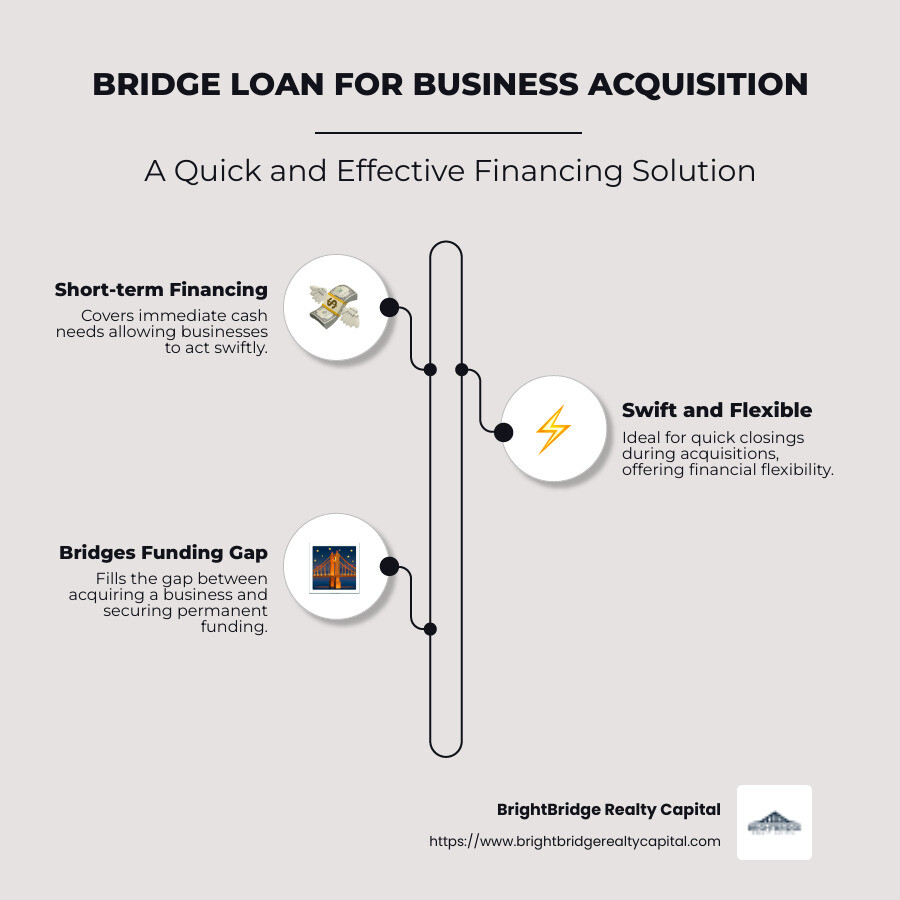Bridge Loans Uncovered: Strategies for Successful Business Acquisitions

Bridge loan for business acquisition offers a critical solution for those looking to swiftly seal business deals without waiting for traditional financing to come through. In a market, the flexibility and speed of bridge loans make them an invaluable tool for real estate investors and business acquirers alike.
Here’s a quick snapshot:
- Short-term financing solution: Covers immediate cash needs.
- Swift and flexible: Ideal for quick closings during acquisitions.
- Bridges the gap: Fills the gap between buying a business and securing permanent funding.
A bridge loan is like a financial lifeline for businesses eager to jump on an acquisition opportunity but need more time to arrange long-term financing. It gives businesses the leverage and resources they need to act quickly, ensuring they don't miss out on strategic opportunities.
Real estate investors in particular find bridge loans useful, as these loans allow them to act promptly, capture valuable properties, and expand their portfolios without delay.

Bridge loan for business acquisition terms simplified:
Understanding Bridge Loans for Business Acquisition
When you're in the market for a new business, timing is everything. Bridge loans for business acquisition offer a fast and flexible way to secure the funding you need, right when you need it. Let's break down what makes these loans an attractive option.
Key Features of Bridge Loans
Temporary Loan: At its core, a bridge loan is a short-term, temporary loan. It's designed to cover the immediate financing gap between acquiring a business and securing permanent funding. This is crucial when you're in the midst of a business acquisition and can't afford delays.
Short-Term and Maturity: Typically, bridge loans have a maturity period ranging from six months to a year. This short-term nature means you get quick access to funds, but it also requires you to have a clear plan for repayment or refinancing once the loan term ends.
Interest Rates: Bridge loans often come with higher interest rates compared to traditional loans. This is because they offer fast access to capital and are intended to be a temporary solution. However, the speed and flexibility they provide can outweigh the cost of higher interest rates for many businesses.
Benefits of Using Bridge Loans
Quick Funds: One of the standout benefits of bridge loans is the speed at which you can access funds. This is essential when you're competing in a market where opportunities can vanish in an instant.
Working Capital: Bridge loans can provide the working capital needed to keep your business running smoothly during an acquisition. Whether it's covering payroll, rent, or other operating expenses, having this financial cushion can be a game-changer.
Immediate Opportunities: With bridge loans, you can seize immediate opportunities without waiting for traditional financing. This is particularly valuable in competitive markets where timing is everything.

In summary, bridge loans are a powerful tool for business acquisitions, offering quick, flexible funding to bridge the gap while you secure more permanent financing. This makes them an essential part of the financial strategy for businesses looking to expand quickly and efficiently.
How to Secure a Bridge Loan for Business Acquisition
Preparing Your Business for a Bridge Loan
Securing a bridge loan for business acquisition starts with understanding what lenders look for. Lenders want to minimize their risk, so they focus on several key factors:
Credit Score: A strong credit score can significantly improve your chances of approval. It's a measure of your creditworthiness and indicates how reliably you have managed debt in the past. Aim for a high score to access better terms and lower interest rates.
Debt-to-Income Ratio (DTI): This ratio compares your monthly debt payments to your monthly income. A lower DTI suggests you have more income available to meet new debt obligations, making you a more attractive candidate for a bridge loan.
Annual Revenue: Consistent and sufficient revenue assures lenders that you have the cash flow needed to repay the loan. Most lenders look for a minimum monthly revenue, often around $10,000, to ensure you can handle the loan payments.
Collateral: Bridge loans are typically secured loans, meaning you'll need to provide collateral. This could be real estate, inventory, or other business assets. Having clear documentation for these assets is crucial for a smooth application process.
Steps to Apply for a Bridge Loan
Once your business is prepared, it's time to dive into the application process:
Gather Documentation: Collect all necessary documents. This typically includes legal identification (like a driver's license or EIN), financial statements (profit and loss, balance sheets), and tax returns. Being organized speeds up the process.
Understand Lender Criteria: Different lenders have different requirements. Contact potential lenders to understand their specific criteria. This can include minimum credit scores, DTI thresholds, and revenue requirements.
Complete the Application: With your documents and understanding of lender criteria, fill out the application. Many lenders offer streamlined online applications. At BrightBridge Realty Capital, for example, the process is designed to be quick and efficient.
Approval Process: Once submitted, the lender will review your application. This includes assessing your creditworthiness, revenue stability, and the value of your collateral. If everything checks out, you could receive approval in as little as 24 hours.
Receive Funds: After approval, funds can be transferred quickly, sometimes within a day. This rapid access to capital is a key benefit of bridge loans, allowing you to move forward with your business acquisition without delay.
By preparing thoroughly and understanding the application process, you can secure a bridge loan efficiently and effectively, ensuring your business acquisition goes smoothly.
Strategies for Successful Business Acquisitions with Bridge Loans
When it comes to business acquisitions, timing and structure are everything. Using a bridge loan for business acquisition can be a smart move, but you need to be strategic about it.
Timing and Market Considerations
Timing is critical. The market can be volatile, which impacts your ability to secure permanent financing. Recent market conditions have shown increased volatility, delaying the refinancing of bridge loans. This means you might end up holding onto the bridge loan longer than planned, which can be costly.
To steer these challenges, consider these strategies:
Monitor Market Conditions: Stay informed about market trends. If the market is stable, you can likely secure permanent financing quickly. If it's volatile, be prepared for delays and have a backup plan.
Plan for Refinancing: Have a clear refinancing strategy in place. This could involve issuing high yield bonds or securing other forms of permanent financing. High yield bonds are often used as take-out financing but come with their own set of risks and benefits.
Be Ready to Act Quickly: When the market is favorable, act fast to secure permanent financing. Delaying can result in higher costs and increased funding risk.
Structuring the Loan for Success
The structure of your bridge loan can significantly impact its success. Here are key components to consider:
Commitment Fee: This is a fee you pay to the lender for committing to provide the loan. Structure this fee wisely to avoid unnecessary costs.
Funding Fee: This fee is charged when the loan is funded. It's important to negotiate this fee upfront and understand how it impacts your overall loan cost.
Conversion Fee: If your bridge loan extends into a longer-term loan, a conversion fee may apply. This fee compensates the lender for converting the bridge loan into a more permanent structure.
By carefully considering these fees, you can better manage your loan costs and reduce financial strain.
Additionally, negotiate terms that allow flexibility. For example, securing a "Cap" on interest rates can protect you from rate spikes if the market conditions change unfavorably. Also, consider structuring the loan to allow for quick refinancing once permanent financing options become available.
By understanding the intricacies of timing and structuring your bridge loan, you can mitigate risks and set your business acquisition up for success.
Leading into the next section, we will explore frequently asked questions about bridge loans, helping you make informed decisions for your business acquisition.
Frequently Asked Questions about Bridge Loans for Business Acquisition
What is the typical duration of a bridge loan?
Bridge loans are designed to be short-term solutions. Typically, they have a duration of one year or less. However, if the borrower is unable to secure permanent financing within this period, the bridge loan may convert into a longer-term loan. This conversion often comes with different terms, such as a fixed interest rate known as the "Cap" rate.
How does a bridge loan differ from other financing options?
Bridge loans differ from other financing options in several key ways:
Short-Term Nature: Unlike traditional loans, which can have terms lasting several years, bridge loans are temporary and meant to cover immediate funding needs.
Speed of Access: The application process for bridge loans is faster, often providing funds within 24 hours. This quick access is ideal for taking advantage of immediate business opportunities.
Higher Interest Rates: Due to their short-term nature and quick availability, bridge loans generally have higher interest rates compared to long-term financing options.
Collateral Requirements: Bridge loans often require collateral, such as real estate or other business assets, to secure the loan. This can make them more accessible to businesses with valuable assets.
What are the risks associated with bridge loans?
Bridge loans come with several risks that businesses should consider:
High Interest Rates: The cost of borrowing can be significantly higher than other forms of financing, leading to increased financial strain over time.
Market Volatility: If the market conditions are volatile, refinancing the bridge loan into permanent financing can be challenging, potentially extending the loan's duration and increasing costs.
Collateral Risk: Since bridge loans are often secured with collateral, failure to repay the loan could result in the loss of valuable business assets.
Fee Structure: Various fees, including commitment, funding, and conversion fees, can add up, making it essential to understand and negotiate these costs upfront.
By weighing these risks and understanding the unique features of bridge loans, businesses can make informed decisions about using this financing option for acquisitions.
Next, we'll dig into strategies for effectively managing these risks and maximizing the benefits of bridge loans in business acquisitions.
Conclusion
In business acquisitions, bridge loans offer a crucial lifeline. They provide the quick funds necessary to seize immediate opportunities. At BrightBridge Realty Capital, we pride ourselves on offering customized solutions custom to your specific needs, ensuring your investment strategy stays on track.
Our approach is simple: fast closings and direct lending without intermediaries. This means you can secure funding quickly, often within a week, allowing you to focus on what truly matters—growing your business. Our nationwide reach ensures that no matter where your investment properties are located, we can provide the capital you need.
Our seamless process is designed to be straightforward and hassle-free. From your initial application to final payoff, our team of experts is dedicated to managing every detail in-house. This ensures a smooth and efficient experience, so you can move forward with confidence.
If you're ready to explore how a bridge loan can support your next business acquisition, we invite you to learn more about our customized real estate financing solutions. Experience the BrightBridge advantage and let us help you bridge the gap to success.


